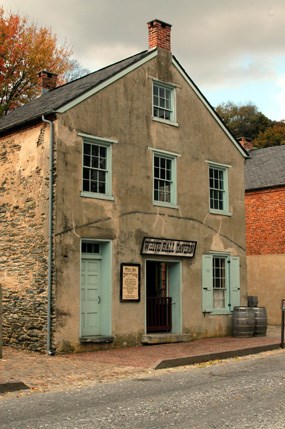A Patriotic Story from Harpers Ferry's History
Catherine Oliver
The Fourth of July has traditionally been a merry time in Harpers Ferry--but not in 1861. The nation was newly embroiled in a civil war that would devastate the town. That first wartime Independence Day also marked the first death of a Harpers Ferry civilian in the conflict.
 |
| Roeder House, being used as a confectionery [HAFE-1359_NHF4068] |
The victim’s name was Frederick Roeder. He operated a number of businesses in town, but was best known as a confectioner. He made breads, pies--the sweeter things in life. Some accounts recall Frederick hanging out along the railroad tracks, offering his pies to hungry passengers as trains paused at the B&O station. One can imagine the aromas his bakery must have emitted: an island of cozy delicacy in a government factory town.
According to the Roeder family tree, Frederick had been born in Saxony--a small state in what would eventually become a unified Germany. Saxony was known as a hotbed of revolutionary activity during the mid-nineteenth century, and while it is uncertain precisely when Frederick left--it is estimated to be sometime in the late 1830s or early 1840s--his decision allowed him to escape much political upheaval and violence in Europe. Emigrating to America as a young man, he married another immigrant from his native Saxony. Together with his wife he raised seven children, and was fiercely proud to call himself an American.
According to the Roeder family tree, Frederick had been born in Saxony--a small state in what would eventually become a unified Germany. Saxony was known as a hotbed of revolutionary activity during the mid-nineteenth century, and while it is uncertain precisely when Frederick left--it is estimated to be sometime in the late 1830s or early 1840s--his decision allowed him to escape much political upheaval and violence in Europe. Emigrating to America as a young man, he married another immigrant from his native Saxony. Together with his wife he raised seven children, and was fiercely proud to call himself an American.
Sadly, Frederick would eventually realize he had not avoided a civil war after all.
 |
| The White Hall Tavern was owned and operated by Frederick Roeder. [NPS/Wassel] |
His wife passed away in March of 1861. A month later, the destruction of the federal armory--whose workers had provided the bulk of his customer base--devastated his business. After Confederate troops destroyed the railroad bridge, even the trains stopped running. Frederick’s entire world had turned upside down.
As the first Independence Day after Virginia’s secession approach, Unionist Frederick eagerly responded to a rumor that the Stars and Stripes would be unfurled on Maryland Heights. As he walked out to view the flag he loved, a sniper’s bullet intended for a rebel soldier struck Frederick instead. Mortally wounded, Frederick retreated to his shop, where he soon died.


Comments
Post a Comment